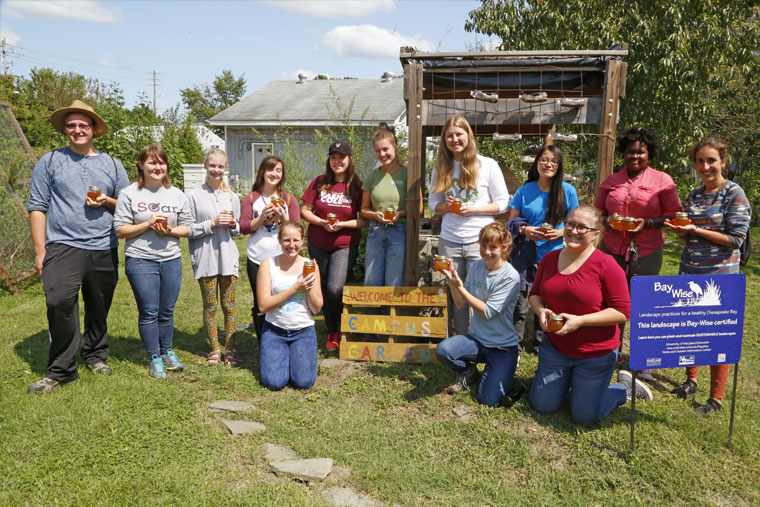Wildflowers and Magic
October 1, 2017
The Campus Garden is abuzz with excitement. Students harvested honey from campus for the first time in Washington College history—and not one sting!
For the first time, Washington College students harvested honey from the two-year-old Campus Garden apiary, collecting about two gallons of the golden sweet stuff to fill more than 30 jars—one of which went to President Kurt Landgraf on the eve of his inauguration in September.
“I was surprised at how much honey we got just from one box,” says Kelsey McNaul '18, a double major in environmental studies and sociology. “After installing the bees last spring, I would have never imagined that only a few short months later we would have enough honey to fill over 30 jars.”
McNaul completed the co-curricular Beekeeping 101 course offered by the Department of Environmental Science and Studies, which trains students in everything from apiary design to winterization of honeybees. Even if course graduates don't become beekeepers, the program enables students to develop a close relationship with and better understanding of pollinators.
She joined 12 other students and Campus Garden adviser Shane Brill '03 M'11 one sunny afternoon to extract the fruits of the bees' labors. Wearing protective gear and applying a smoker only when needed, the students carefully pulled a super—a box filled with combs of honey—from the apiary.
“It was so calm, we were one with the bees,” says Nicole Hatfield '21. “And there were no bee stings!”
The bees “stayed mellow and harmless throughout the entire process,” agrees Adahne Hemp '21. “The experience I shared with the other Garden Club members made me even more interested in bees than I already was, and it made me excited to work with the Campus Garden again.”
After gently collecting a super, Julia Portmann '19 led the beekeepers and gardeners to her residence hall suite, just steps from the Campus Garden. Gathered around a table and using basic kitchen implements—forks, bowls, spatulas, and colanders—students poured the honey into jars. Portmann helped to establish the hives last spring, and was happy to be a part of the first honey harvest.
“It tastes great, and it's even better knowing that it came from right outside my front door, from bees that I have worked with, and flavored by plants that I have watched grow and develop,” says Portmann, a biology and environmental science double major. “I imagined the process being much more complicated, but establishing the bees and extracting the honey was a lot of fun.” She wants to continue keeping bees after college, noting that we all have a responsibility to preserve pollinator habitat to counteract the decline of species crucial to our survival.
Campus Garden intern Emily Castle '18 has also spent a lot of time in the company of the bees. “I was most surprised to find that the honey ranged in color from shades of a dark amber to an orangey gold in each set of combs,” she says. “The different colors reflect the diverse nectary sources we have in the garden for the bees.”
Jimmy Looper '21 takes seriously the responsibility that humans bear for the current problems facing pollinators.
“We should return the favor for all things bees do for us,” he says. “I love the idea of perhaps keeping bees in the future. I truly did not realize just how beneficial a hive, no matter the size, can be on the surrounding area, and you get free, delicious honey. What's not to love?”
So what does Washington College honey taste like?
“Like wildflowers and magic,” says Castle.
“So much better than store-bought honey, and there was so much happiness during the honey-making process,” Hatfield says. “Everyone had a permanent awestruck smile on their face. It tasted like a sweet gift from nature.”
“Washington College honey is the sweetest and most delicious honey you will ever taste,” says McNaul. “With each taste, I feel so proud of what our bees and Garden Club members were able to produce. I love it!”
Working in the apiary is one of many experiences bridging food and environment that are organized through the Food Initiative. Students interested in participating in the campus beekeeping program can contact Shane Brill.

